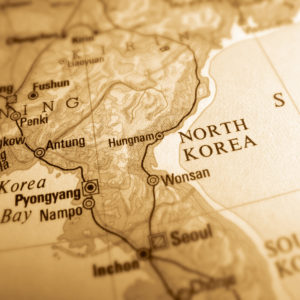The French have two expressions that capture the essence of Kim Jong-un’s New Year address. First, there’s “deja vu” ― or maybe “deja vu all over again,” as the American baseball player Yogi Berra famously put it. And then there’s “plus ca change, plus c’est la meme chose” ― “the more things change, the more they stay the same.”
The circumstances no doubt change from year to year, but we’ve seen this whole drama before: hopes crazily raised by nice words and gestures, then dashed on the rocks by North Korea’s refusal to live up to its promises. That’s how it seemed yet again as Kim on New Year’s Day called for the United States to give up sanctions and relieve the “pressure” ― a reference implicitly to nukes on U.S. ships and planes prowling the region.
Just because nothing much has really changed on the path to reconciliation does not mean North Korea-watchers — just about everyone — should stop making predictions, alternating between wishful thinking and forecasts of doom. This time of year, it’s appropriate to gaze into our crystal balls.
The fact that forecasts are wrong, off-key or dumb doesn’t matter since nobody six months or a year from now will remember them. Personally, I’ve been so surprised by the twists and turns of Korean history ever since the North Korean invasion of the South in June 1950 that I would not hazard a guess on what’s likely next month or the month after, much less by the end of the year.
Forecasts nowadays fall into two camps. More than a few soothsayers think the process of reconciliation, of dialogue and summitry, simply cannot work. I have seen any number of predictions of a return to the bad old days of nuclear and missile tests, threats and counter threats, rhetoric and reprisals and all the rest.
Then there’s the equally opinionated bunch that think those days are gone. OK, they concede, North Korea, or Kim, may not do everything as promised, but we won’t see more testing, more threats, real terrorism. These people are convinced the trend is toward lasting peace, maybe reunification, if not this year, then in the next few years.
Actually, I would not denounce either of these extremes as wrong or impossible. Maybe they’re both correct ― first rapprochement and reconciliation, then the holy hell of same old, same old conflict and confrontation. Or, maybe there’ll be conflict, then reconciliation.
Or we may be surprised by upheavals and revolts that fall into neither of the obvious categories. As often noted, no one predicted the Korean War. Nor did anyone predict last year’s expressions of goodwill leading to all those summits ― President Moon Jae-in and Kim, then President Donald Trump and Kim.
If those summits seemed the stuff of fantasy before they happened, what about reunification or at least confederation of the two Koreas? I have heard people saying, quite seriously, that North-South barriers will fall in the next few years, that mail, traffic, trade, reunions and tourism will resume before we know it.
Isn’t that what tearing down some of those guard posts on either side of the demilitarized zone was all about? And what could be more convincing than a train moving from South to North Korea carrying experts assessing the needs to get North-South rail traffic moving for the first time since before the Korean War?
Having heard all that talk before, though, I’ll believe it when I see it. It’s also possible that North-South agreements of peace, reconciliation and non-aggression could be nonsense. History is littered with lofty ideals expressed on paper only to be trampled on by those who wrote and signed them.
This year, 2019, is a year of anniversaries. It was 100 years ago in June that the combatants got together at Versailles and signed the treaty that ended “the Great War.” That war is now known as World War I ― the prelude to the much worse World War II that broke out 20 years later.
And, as every Korean knows, it was 100 years ago, as of March 1, that Koreans rose against Japan, the colonial overlord. The revolt was a short-lived, bloody, a tragedy memorialized as one of Korea’s most important holidays.
We can only pray, this time, the optimism engendered by last year’s summitry portends real peace ― not just another act in the long-running drama of high hopes and dismal failure.

